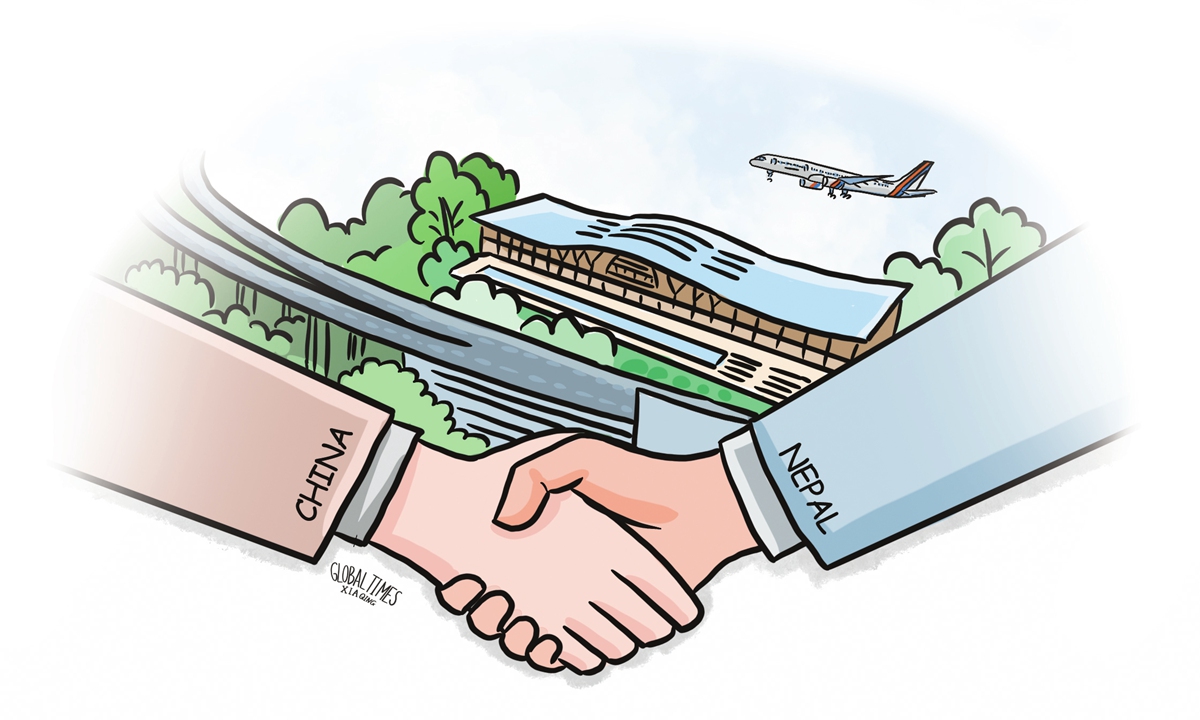
Illustration: Xia Qing/GT
Nepal's Prime Minister, KP Sharma Oli, who took office in July, is making an official visit to China from Monday to Thursday. This visit breaks the tradition of Nepali prime ministers making their first official visit to India after taking office, highlighting Nepal's emphasis on its relationship with China. Driven by cooperation under the Belt and Road Initiative (BRI), China-Nepal relations have entered a new phase, with bilateral ties constantly deepening.
Next year marks the 70th anniversary of the establishment of diplomatic relations between China and Nepal, an occasion both sides highly value. Chinese President Xi Jinping met with Nepali Prime Minister Oli in Beijing on Tuesday, pledging efforts to advance China's strategic partnership of cooperation with Nepal. Noting that there are no problems, only friendship, between Nepal and China, Oli thanked China for providing various valuable support to Nepal.
Oli's visit has attracted attention from the Indian media, even prior to this event. Due to the Nepali leader's departure from the "visit-India-first" tradition, some Indian media outlets have begun questioning whether there is an incremental shift in Nepal's foreign policy. In light of India's increasingly weakening control over the South Asian regional structure, some forces in India cannot conceal their unease and worry.
One of the reasons some Indian media have been keeping a close eye on the China-Nepal relationship is its rapid development over the years.
The new developments in China-Nepal relations in the new era are a result of shared interests cultivated by both countries. China firmly supports Nepal in upholding its independence, sovereignty and territorial integrity, and respects and supports Nepal's independent choice of social system and development path that suits its national conditions.
Nepal is an active participant in China's major initiatives. It signed a Memorandum of Understanding on cooperation under the BRI in 2017. Prime Minister Oli's visit to China this time aims to further advance the BRI cooperation between the two countries. Nepal is also an enthusiastic supporter of the Global Development Initiative, Global Security Initiative and Global Civilization Initiative.
In recent years, China and Nepalhave strengthened cooperation in the field of connectivity. The China-Nepal joint statement released on Tuesday emphasized that "the two sides agreed to jointly advance the fourth phase of the China-aided Araniko Highway maintenance project and the Hilsa-Simikot Road project, implement the second phase of the Kathmandu Ring Road Improvement Project, and welcome the signing of the Letters of Exchange for the Approval of the China-aid Project of Feasibility Study for the Tokha-Chhahare Tunnel."
The main reasons for the rapid development of China-Nepal relations are the two countries' respect for each other's core interests and major concerns, as well as their huge complementary interests. To realize its development vision, Nepal needs to improve its domestic infrastructure and attract a large amount of foreign investment to promote its economic growth. The BRI provides great opportunities for Nepal. At the same time, China's successful battle against poverty can offer valuable experiences for Nepal. In the future, in addition to strengthening cooperation in the field of connectivity represented by infrastructure, helping Nepal overcome poverty will be a core area of cooperation between the two countries.
To enhance their strategic autonomy, South Asian countries have been striving to develop economic and trade relations with external powers. Reducing excessive reliance on India is not only a crucial issue for Nepal but also for many other South Asian countries, such as Bhutan, the Maldives and Bangladesh. Some voices in India need to understand that Oli's visit to China is a development-oriented decision. Regional countries are not taking sides; they are choosing development.
The author is an associate professor at the School of International Relations of the Sichuan International Studies University. opinion@globaltimes.com.cn



